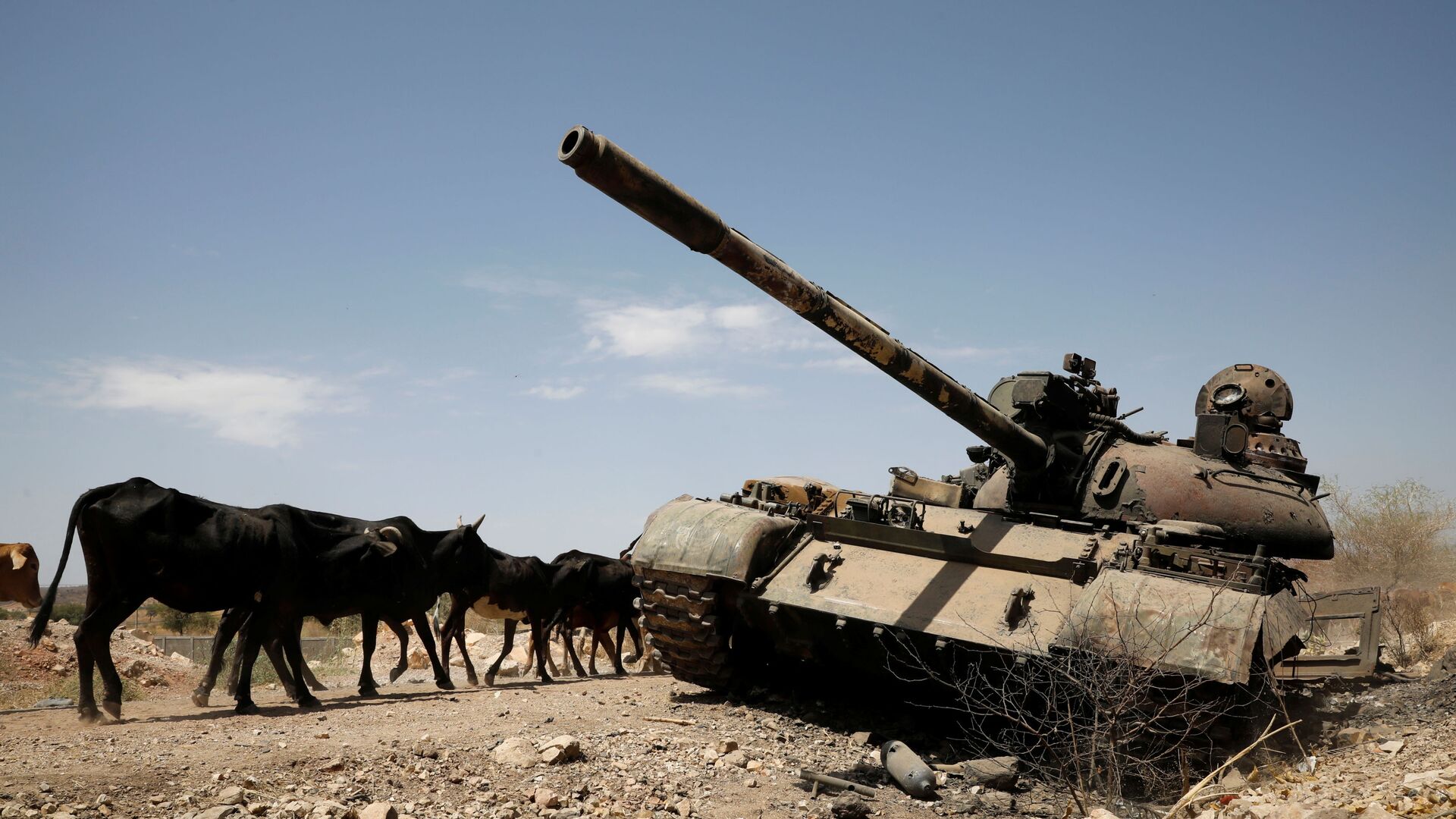The Ethiopian government has claimed it could re-enter the capital of the rebel region of Tigray “within weeks” but says it is facing a bigger threat, hinting at a possible attack by Sudan or Egypt.
The Tigray Defence Forces (TDF) rebels - led by the Tigray People’s Liberation Front (TPLF) - recaptured Mekelle on Monday, 28 June, after a 10-day offensive which forced Ethiopian troops to retreat.
— The Hargeisa Times (@HargeysaTimes) June 29, 2021
The fall of the regional capital was a humiliating blow to the government of Ethiopia’s Prime Minister Abiy Ahmed.
But on Wednesday, 30 June, Redwan Hussein, a spokesman for the Ethiopian government’s Tigray taskforce said, in an apparent reference to Sudan: "Ethiopia is exposed to an attack from outsiders."
— Addis Standard (@addisstandard) June 30, 2021
Mr Redwan said the ceasefire had been "made for humanitarian cause" but he claimed: "If it is required, we can easily enter to Mekelle and we can enter in less than three weeks."
The head of the Ethiopian Army, Lieuteant General Bacha Debele, added: "The TPLF is no more a threat, but we've got a more national threat that we need to shift our attention to."
Ethiopia has been at loggerheads with Sudan and Egypt over its plans to complete the Grand Ethiopian Renaissance Dam (GERD), which they fear will affect the flow of water downstream in the Nile.
Mr Abiy’s government invaded the northern region of Tigray in November, claiming the local government, led by the TPLF, were out of control.
Report: some of the cities/areas liberated by TDF :
— Martin Plaut (@martinplaut) June 30, 2021
Adwa
Axum
May Mekden
Adi Guyem
Freweyni
Samre
Gijet
Negash
Agula
Idaga Hamus
Hagere Selam
Abi Addi
Ambalage
Hiwane
Enda Medhane Alam
May Keyih
Shire
Mehoni
Maychew
Wukro
Adigrat
Raya
Humera
Alamata
Ethiopian troops, backed by Eritrean forces who crossed over the border into northern Tigray, quickly took over the capital Mekelle and most of the urban areas as the rebels retreated to the mountains.
But in recent weeks the TPLF and their allies have mounted a stunning counter-attack which culminated in them retaking Mekelle on Monday.
Reasons for unilateral ceasefire from the defeated government of Ethiopia/Amhara:
— Tyrone-Darius (@WBayru) June 30, 2021
Yesterday:
• It’s to allow Tigryan farmers resume their activity.
Today
• Ethiopia needs to prepare against external threat- by implication; Ethiopia going to war against Egypt & Sudan!
🤔 pic.twitter.com/FBFKZyaBdl
Negasi Tesfaye, a political observer in Addis Ababa, said: "Tigrayans will 100 percent go for independence. They will not make the same mistake as 1991 where they thought they were Ethiopians."
Mr Tesfaye said: "Abiy Ahmed and the Amhara elite have shown Tigrayans that they are not Ethiopians, that Ethiopians despise them, and use TPLF as a cover for their hatred of Tigrayans. Abiy’s support base is entirely dependent upon Amhara nationalists, Addis Ababa opportunists and Westrn support, due to his liberalisation policies."
He said: “Amharas may abandon him if he gives up fighting Tigray. My theory is Amharas are using him and will discard him after the war with Tigray is over, similar to what they did with Aman Andom in 1974. He is not fully Amhara after all, so they view him with disdain.”
In September 1974 Aman Andom took over as head of state after the Emperor Haile Selassie was deposed by a military coup but was killed two months later after a shootout with other members of the Derg, the socialist junta which had taken over.
BREAKING: #Tigray defense forces capture north Ethiopian town of Sheraro. The town fell without any fighting after Ethiopian troops vacated.#Ethiopia govt says the army has withdrawn from Tigray region due to humanitarian reasons, TDF Spokesman called the statement 'Sick Joke". pic.twitter.com/32mx50pSeT
— Morad News (@MoradNews) June 30, 2021
The TPLF dominated Ethiopia's national politics between 1991 and 2012, when its leader Meles Zenawi died of cancer.
His successors gradually lost their grip on power and the TPLF retreated to Tigray as Amhara and Oromo politicians took over in Addis Ababa.
Abiy Ahmed won the Nobel peace prize when he negotiated a deal with Eritrea to end years of border conflict but he then decided to neutralise the TPLF, an ambition which has apparently backfired on him.The fighting in Tigray has displaced two million people and there have been reports of brutal gang rapes and mass killings by Ethiopian and Eritrean troops.
-“A day after retaking the capital…[TPLF] forces have indicated they have little appetite for a truce”
— Simon Tesfamariam (@stesfa) June 29, 2021
-TPLF: “Our primary focus is to degrade enemy fighting capabilities so if going to Amhara is what it takes, we will do it, if going to Eritrea is what it takes, we’ll do it.” pic.twitter.com/ZpcYsCymzv
The UN has accused Ethiopian and Eritrean forces of blocking food convoys to 350,000 people it claims are facing famine.
Eritrean forces have abandoned the town of Shire in northern Tigray and fled back across the border.
Mr Tesfaye said the TDF had talked about attacking Eritrea and the neighbouring Amhara region but he said that was “risky” and they might “overreach” themselves.
He said while the Eritrean leader Isaias Afwerki and his regime had oppressed his people for 30 years it was unlikely the Tigrayans would be seen as “liberators.”




